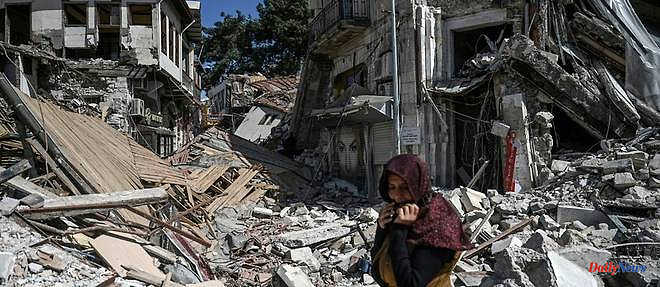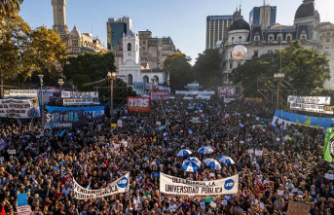Volunteers blocked by the authorities, lack of external aid, complicated weather: a month after the earthquake which killed more than 50,000 people in Syria and Turkey, NGOs recount the "chaotic" conditions on the ground in the first days of the disaster .
Present in the north-west of Syria at war, Handicap International could only count, in the hours following the 7.8 magnitude earthquake that occurred on February 6, "on itself", explains Myriam Abord- Hugon, director of the NGO's Syria program.
Firstly because its local team, made up of a hundred people living in Syria, suffered the earthquake itself and its many aftershocks.
"We spent the first hours making multiple calls to count our workforce. When we saw that a person was missing and that his house had been destroyed, it was dreadful," says Myriam Abord-Hugon, saddened that she was found dead under the rubble three days later.
However, the groups of rescuers deployed on the spot more than once found themselves unable to intervene in the debris of the buildings under which there were victims.
As much because of "the immensity of the disaster", which generated according to UN estimates up to 210 million tons of rubble in the two countries, notes the official, as for lack of equipment, in particular bulldozers.
The impossibility of receiving reinforcements and equipment from outside the country considerably "limited things" for the humanitarian teams in this landlocked rebel area of Syria, including the only border post then open with Turkey, Bab al -Hawa, was damaged during the earthquake.
"Even if hospitals were accustomed, with the war, to taking care of polytrauma patients following a collapse, they were overwhelmed by the number of injured from the earthquake", notes Myriam Abord-Hugon.
In Turkey, where international aid began to arrive the day after the earthquake, some volunteers found themselves immobilized by the local authorities.
This was particularly the case for a dozen particularly crucial hours at Kahramanmaras airport, in the south-east of the country, relates Ezgi Karakus, an NGO volunteer present on the spot.
"Our team leader had to requisition a municipal bus so that we could get to Islahiye after twenty-four hours," she recalls.
The volunteer regrets that NGOs have been forced to act only in areas designated by Afad, the Turkish government authority in charge of emergency situations.
President of the emergency aid association SOS Attitude, John Diksa was able to distribute, thanks to Afad, emergency equipment (tents, sleeping bags, blankets) to villages in the region of Elbistan, near from the epicenter of the second earthquake that struck Turkey on February 6.
But his team initially faced difficult weather conditions.
"It was between -15 and -20 degrees at night, and it took almost five hours to cover only five kilometers because of the snow", details the volunteer.
It was only during its second week in the field, in the agricultural region of Pazarcik, that things "became more complicated" for SOS Attitude, after the Turkish army, gendarmerie and police suddenly commandeered the local aid distribution center and the expulsion of all its volunteers.
Deprived of an operational base, in the middle of negotiations with customs to recover equipment blocked at the port of Mersin, the association had to rush its return to France because of a mechanical problem with its car, which prevented it from continuing its work. ground.
A month after the disaster, John Diksa is preparing to return to Turkey to continue his efforts to help refugees with housing, "their greatest current need", while Ezgi Karakus worries about "major hygiene problems". caused by lack of water in the affected areas.
In Syria, where cross-border crossing points with Turkey were temporarily opened by the authorities in mid-February, Handicap International is now focusing its efforts on psychological support and physical rehabilitation for survivors.
With a clear objective, underlines Myriam Abord-Hugon: "to prevent their injuries from becoming permanent handicaps".
03/08/2023 16:31:34 - Paris (AFP) - © 2023 AFP












